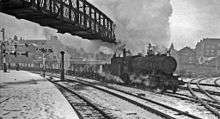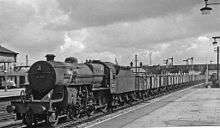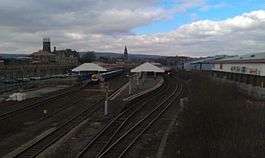Bolton Interchange
| Bolton | |
|---|---|
|
View of platforms 1-4 (right to left) looking northwards | |
| Location | |
| Place | Bolton |
| Local authority | Metropolitan Borough of Bolton |
| Coordinates | 53°34′23″N 2°25′30″W / 53.573°N 2.425°WCoordinates: 53°34′23″N 2°25′30″W / 53.573°N 2.425°W |
| Grid reference | SD719086 |
| Operations | |
| Station code | BON |
| Managed by | Northern |
| Number of platforms | 4 (soon to be 5) |
| DfT category | C1 |
|
Live arrivals/departures, station information and onward connections from National Rail Enquiries | |
| Annual rail passenger usage* | |
| 2010/11 |
|
| – Interchange |
|
| 2011/12 |
|
| – Interchange |
|
| 2012/13 |
|
| – Interchange |
|
| 2013/14 |
|
| – Interchange |
|
| 2014/15 |
|
| – Interchange |
|
| History | |
| Key dates | Opened 1838 |
| National Rail – UK railway stations | |
| * Annual estimated passenger usage based on sales of tickets in stated financial year(s) which end or originate at Bolton from Office of Rail and Road statistics. Methodology may vary year on year. | |
|
| |
_Station%2C_entrance_-_geograph.org.uk_-_1845173.jpg)
Bolton Interchange is a transport interchange combining Bolton railway station and a four stand bus station in the town of Bolton in Greater Manchester, England.[1] The station is located on the Manchester spur of the West Coast Main Line and is managed by Northern. The station is 11 1⁄4 miles (18.1 km) north west of Manchester Piccadilly.
The railway station was originally named Bolton Trinity Street to differentiate it from nearby Bolton Great Moor Street station which closed in 1954.[2] The station was also known as "Bridgeman Street Station" and "Bradford Square Station".[3]
The entrance and ticket office are at street level, at which there is a bus interchange and taxi rank. A walkway leads to the platforms which are in a cutting. The main island platform has a buffet. The original main station building was demolished in the 1980s, but the Victorian buildings survive on the platforms. The clock tower was dismantled and rebuilt next to the new station.
The station is on the Ribble Valley Line, a local line running north to Blackburn and Clitheroe. There are services used by commuters from Wigan Wallgate and on the Manchester to Preston Line. Recent timetables provide a convenient connection (although a platform change must be made which is not possible for wheelchair users) at Hindley (Wigan, Kirkby and Southport bound trains from Bolton) for certain stations on the Atherton line (Daisy Hill, Hag Fold, Atherton and Walkden).
History
Trinity Street station opened when the Manchester and Bolton Railway completed its route to Salford Central in 1838. The line extended to Manchester Victoria in 1843.[4] This line was extended to Preston by the Bolton and Preston Railway in 1841. The route northwards, now the Ribble Valley Line, to Blackburn followed four years later, whilst the Liverpool and Bury Railway's arrival in 1848 gave the town links eastward to Bury & Rochdale and westwards to Wigan & Liverpool. These lines had all become part of the Lancashire and Yorkshire Railway system by 1858.
The network of routes radiating from here has remained largely unchanged to this day, the one exception being the line to Rochdale which closed on 5 October 1970.[5] Through trains to Liverpool ended in 1977 with the closure of Liverpool Exchange station, but the line to Wigan remains open. Trains to Manchester Piccadilly and beyond began running in May 1988 with the opening of the Windsor Link.




Installation of automatic ticket barriers began on 21 November 2016 and are expected to be fully operational on 9 December 2016.
Platforms
The station currently has four platforms in use.
- Platform 1 is used for trains heading north to Blackburn and Clitheroe, and trains heading south to Manchester Victoria.
- Platform 2 is situated at the southern end of the station and allows for trains from the Manchester stations to terminate at Bolton.[6]
- Platform 3 is used for trains heading to Manchester Victoria, Manchester Piccadilly, Manchester Airport, Rochdale, Stockport, Hazel Grove, Buxton and Chester.
- Platform 4 is used for trains heading north and west including Wigan, Southport, Kirkby, Preston, Blackpool, Barrow-in-Furness and Windermere.
Up until the early 1990s, Bolton also had a Platform 5, latterly used for the Red Star Parcels service. This is currently separated from Platform 4 by a brick wall and the track has been concreted over to form a car park for passenger use.
The old platform 5 is being rebuilt to increase capacity
Refurbishment
In 2005 and 2006, part of the station and its surrounding area underwent major refurbishment. The walkway between the ticket office and platforms was modernised along with the station lifts and stairs. Bolton Interchange which serves as a direct connection between bus and rail to certain districts of Bolton was rebuilt, incorporating a taxi rank. The bridge connecting Newport Street with the rest of the town centre was also rebuilt, along with a large arch, which is clearly noticeable in the Bolton skyline.
In 2006 a proposal to refurbish the station toilets, waiting rooms, ticket office and platforms was rejected due to lack of funds.[7] In March 2010, GMPTE launched a consultation which proposed relocating Bolton bus station from Moor Lane to a new site adjacent to Bolton Interchange to improve connections between bus and train services.[8][9] Refurbishment work on the ticket office, platforms and cafe commenced on 15 November 2010.[10]
Despite the £5m renovation work the station remains in a poor state, especially the roof along platforms 3 & 4, which leaks constantly during wet weather. There is also a noticeable lack of facilities at the station. The station no longer houses a station cafe, and the popular newsstand that what once in the main ticket hall was removed during the renovation. For a station that has over 3 million users a year, and for a town the size of Bolton, the station leaves a lot to be desired [11]
Transport for Greater Manchester is working with Kier Construction to build a brand new bus and rail interchange, which will also include a Cycle Hub. This will make it easier for local people to use public transport by bringing bus, cycle and rail services closer together.
The new interchange, being built on land bounded by Newport Street and Great Moor Street, will replace the existing Moor Lane bus station and provide vastly improved waiting areas, passenger facilities, information, safety and security. It will directly connect bus and rail services via a Skylink pedestrian footbridge, improving transport links, as well as access to the town centre.
The new interchange will offer enhanced accessibility with a modern concourse and passenger facilities including a retail outlet, cycle hub, shop mobility, café and modern public toilets including adult and baby changing facilities. It will also make use of innovative sustainable energy initiatives, including rainwater recycling to flush the toilets, solar panels, air source heat pumps and low-energy LED lighting.
The new transport interchange is being delivered by Kier Construction for TfGM in partnership with Bolton Council. The £48 million scheme is being funded by the Greater Manchester Transport Fund and will support the Bolton Town Centre Transport Strategy and the wider town centre regeneration plans.[12]
Electrification
As of April 2016, in preparation for electrification the replacement of Orlando St. bridge is almost complete, Soho St. bridge has been demolished and track lowering as taken place in the Bullfield Tunnels area. From May 2015 until December 2015, to facilitate the electrification of the route from Manchester to Preston[13] a reduced service pattern was in place as only one track through the Farnworth Tunnel could be used. During this period, many TransPennine Express services were re-routed via Wigan North Western avoiding Bolton altogether. At the weekends train services between Manchester and Bolton were replaced by buses.
Services
Rail
There are frequent rail services to both main Manchester stations provided by Northern. Some of the services to Manchester Victoria continue eastward to Huddersfield via Stalybridge, whilst those to Piccadilly mainly run to either Hazel Grove or Manchester Airport. There are three trains an hour to Wigan for much of the day (with hourly extensions to Southport) and to Blackpool North. There are also a few through services to Barrow-in-Furness and Windermere via Preston and an hourly service to Blackburn and Clitheroe (with extras at peak periods).[14]
Prior to the December 2013 timetable change, a two-hourly service operated to and from Edinburgh Waverley/Glasgow Central (alternating), but these Scottish services on this route now run via Wigan North Western and the newly electrified line over Chat Moss.[15] A small number of Scottish peak services still operated via Bolton/Wigan North Western and Bolton/Chorley using diesel traction until December 2014.[16] There was also a single service to and from Glasgow operated by Virgin Trains in the 2007–08 timetable, but this ended in December 2008.[17]
Most routes have an hourly service on Sundays. Services on the Southport line run through to Stockport and then either to Chester via Altrincham or to Hazel Grove.
Virgin Trains, who operate the InterCity West Coast franchise have committed to commencing services direct to London Euston. These services will start once electrification of the Manchester to Preston line, due to be finished in December 2017, is complete.
First TransPennine Express used to run the service from Manchester Airport to Blackpool North (and to Barrow & Windermere) but this was passed on to the new Northern franchise on 1 April 2016.
Bus
Several bus companies provide a comprehensive route network of services around Bolton and the surrounding areas on behalf of Transport for Greater Manchester: Arriva North West, Stagecoach, Stagecoach Merseyside & South Lancashire, Cumfybus, First Manchester, Diamond Bus North West, Blackburn Bus Company and Rosso.
Other bus companies also provide services to/from Bolton, including: Manchester Community Transport (Route 22 Evenings only between Bolton and Stockport), UK Coachways (Routes 535 Bolton to Belmont, offering 5 buses per day, and 537 Bolton to Sharples Estate offering up to 7 buses per day)
Notes
- ↑ Bolton Interchange - Where to Catch your Bus (PDF), gmpte.com, retrieved 11 July 2015
- ↑ Bolton Great Moor St, Subterranea Britannica, retrieved 2010-04-02
- ↑ Bardsley 1960, p. 7.
- ↑ Marshall 1981, p. 12
- ↑ Marshall 1981, p. 45
- ↑ Northern Rail (17 January 2013). "Platform 2 at Bolton is used for stabling units from Manchester on an evening and a couple of units use this platform in a morning". Twitter. Retrieved 22 January 2013.
- ↑ "Station Revamp Hits the Buffers", Bolton News, retrieved 2010-04-02
- ↑ Public Consultation, gmpte.com, retrieved 2010-04-02
- ↑ A New Bus Station for Bolton (PDF), gmpte.com, retrieved 2010-04-02
- ↑ "Construction begins on Bolton railway station upgrade". manchestertransport.wordpress.com. Retrieved 2011-05-01.
- ↑ http://www.travelwatch-northwest.org.uk/Stations_210.pdf
- ↑ "The new Bolton Interchange". GMPTE. Retrieved 11 July 2015.
- ↑ "Manchester to Preston electrification". Network Rail. Retrieved 11 July 2015.
- ↑ GB eNRT May 2016 Edition, Tables 82 & 94
- ↑ GB National Rail Timetable 2013-14, Tables 65 & 82 (Network Rail)
- ↑ GB eNRT, May - December 2014 Edition, Tables 65 & 82
- ↑ GMPTA December 2008 Timetable Changes 1 February 2008; Accessed 2008-10-30
Bibliography
- Bardsley, James Rodney (1960), The railways of Bolton, 1824-1959, J.R.Bardsley, ASIN B0000CKNFN
- Marshall, J. (1981), Forgotten Railways North-West England, David & Charles, Newton Abbott, ISBN 0-7153-8003-6
External links
| Wikimedia Commons has media related to Bolton Interchange. |
- Train times and station information for Bolton Interchange from National Rail



